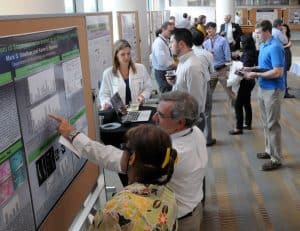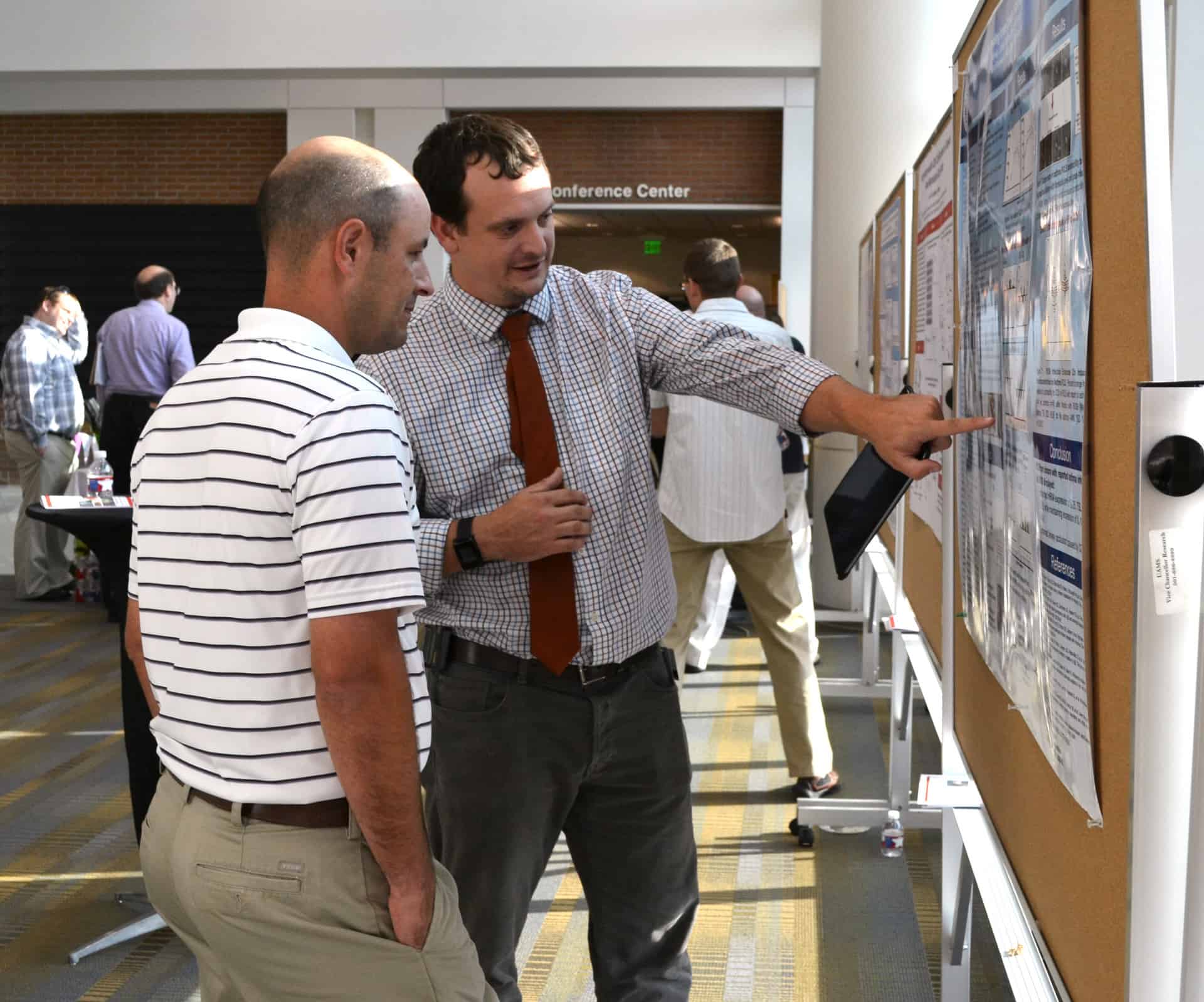Collaboration on Display at Showcase on Infectious Diseases
| Sept. 23 2015 | Fostering collaboration in research is why the UAMS College of Medicine began its Showcase of Medical Discoveries program, which held its 12th event Sept. 16 focusing on infectious disease and the microbiome.
The event featured 17 research projects involving dozens of UAMS scientists and was attended by about 100 researchers, physicians, faculty and students.
“The showcase events are a great opportunity to get some people together who might not ordinarily cross paths, said UAMS Vice Chancellor for Research Lawrence Cornett, Ph.D. “What we’re striving to do is get new collaborations formed and help build teams that might approach a biological problem in a new sort of a way.”
Eight investigators presenting their research fell under the umbrella of the Center for Microbial Pathogenesis and Host Inflammatory Responses, funded by a $10 million, five-year federal Center of Biomedical Research Excellence (COBRE) grant.

Mark S. Smeltzer, Ph.D., (left), chats with DeAnn Hubberd, associate director of the Office of Grants and Scientific Publications and Vice Chancellor for Research Lawrence Cornett, Ph.D.
Mark S. Smeltzer, Ph.D., director and principal investigator of the COBRE, and Richard P. Morrison, Ph.D., chairman of the College of Medicine’s Department of Microbiology and Immunology and COBRE co-director, also presented their research.
The COBRE project is in Phase 1 and applying for Phase 2 funding. For Phase 1, only junior researchers, classified as those who haven’t been approved for R01 funding from the National Institutes of Health, are eligible to be a project leader. To date, three of the four Phase I COBRE project leaders have successfully obtained NIH funding. The total amount of extramural funding obtained by COBRE investigators within the first four years of operation exceeds $11 million.
“Our goal is to provide our project leaders with the resources they need to be successful in getting an NIH R01 type grant,” said Smeltzer. “Once they do, they’re no longer project leaders, they graduate from the program and we recruit someone else. In that way, we build the program and promote the development of synergistic collaborative research relationships that would not otherwise exist.”
J. Craig Forrest, Ph.D., and Jason S. Stumhofer, Ph.D., who started in the COBRE project and have since earned R01 funding for their work, are now collaborating on research into a lymphocyte progenitor cell type. Their investigation started after Stumhofer’s research into malaria and the cell type prompted Forrest to wonder if it could also apply to his work with gammaherpesviruses. The two are now applying for additional grant funding to continue their research.
At the showcase, Joshua Kennedy, M.D., a COBRE investigator, had plenty to discuss with Daniel E. Voth, Ph.D., since both are interested in lung function. Kennedy is investigating the effect of rhinovirus on lung tissue, specifically samples from donors who had asthma, while Voth is studying Coxiella burnetii, which grows inside human lung cells and causes Q fever, a flu-like illness that can develop into a chronic heart condition.
Voth even had suggestions for Kennedy on where to take his research next.
“As a young researcher, there is nothing better than getting your research out there and letting people look at it and tell you where you need to go next,” said Kennedy.

About 100 researchers, physicians, faculty and students attended the Showcase of Medical Discoveries: Infectious Disease and the Microbiome on Sept. 16 at the Winthrop P. Rockefeller Cancer Institute.
Reza Hakkak, Ph.D., professor, chairman of the Department of Dietetics and Nutrition and an investigator at the Arkansas Children’s Hospital Research Institute, is no stranger to collaboration.
His research into how obesity negatively impacts gut microbiota in rats brought together his expertise with that of Soheila Korourian, M.D., from the Department of Pathology and Steven Foley, Ph.D., and Bruce Erickson, Ph.D., both from the Food and Drug Administration’s National Center for Toxicological Research in Jefferson, Arkansas.
Hakkak is finding that obesity is “playing a major role in shifting good gut bacteria to bad bacteria and increasing the chance of developing breast cancer” in rats.
Seventeen posters detailing research by dozens of investigators were on display at the showcase. They were:
- Does the Gut Microbiome Mediate Associations of Menarche with Cardiovascular Disease Risk in Postmenopausal Women?
Researchers: Yan Wang, Robert Delongchamp, Mohammed El Faramawi, Mohammed Orloff, Jordana Bell and Barbara Fuhrman.
- Effects on Obesity on Gut Microbiota Using the Obese Zucker Rat Model
Researchers: Reza Hakkak, Soheila Korourian, Steven Foley and Bruce Erickson.
- Dysbiosis Induced Impairment of Immune Surveillance in Non-gastrointestinal Tumors
Researchers: Samir Jenkins, Carl Cerniglia, Kieng B. Vang-Dings, Robert J. Griffin and Ruud P.M. Dings.
- The Center for Microbial Pathogenesis and Host Inflammatory Responses
Directors: Mark S. Smeltzer and Richard P. Morrison.
- Defeating Staphylococcus aureus as an Orthopaedic Pathogen
Researchers: Mark S. Smeltzer, Karen E. Beenken, Allister Loughran, Daniel Meeker and Danielle Atwood.
- Identification of Host Membrane-trafficking Genes Involved in Coronavirus Infection
Researchers: Jianzhong Cao and Xuming Zhang.
- Mechanisms of Reovirus Bloodstream Dissemination
Researchers: Karl W. Boehme, Joseph Koon, Matthew B. Phillips and Johnasha D. Stuart.
- Identifying Virulence Determinants in the Relapsing Fever Spirochete, Borrelia turicatae
Researchers: Jacob I. Latham, Danielle E. Fortune, Marissa Podgorski and Jon S. Blevins.
- Memory Follicular Helper T Cells Promote Rapid Antibody Production after Secondary Plasmodium yoelii Infection
Researchers: Daniel J. Wikenheiser and Jason S. Stumhofer.
- Tracking Antigen-specific CD4 T Cell Responses to Chlamydia Female Reproductive Tract Infection
Researchers: Lin-Xi Li and Stephen J. McSorley.
- Rhinovirus Infection Induces Th2-Promoting Innate Cytokines in Ex Vivo Precision Cut Lung Slice Airways
Researchers: J.L. Kennedy, E. Brown, M. Kurten, S.M. Jones and R.C. Kurten.
- Myxoma Virus Differentially Influences Human CD14+ Myeloid Cells from Healthy Donors and Ovarian Cancer Patients
Researchers: Shana Chancellor, Jason Liem, Bernice Nounamo, Martin Cannon and Jia Liu.
- Use of a Novel Bone-Targeting Agent for the Enhanced Delivery of Vancomycin to Bone
Researchers: Zaineb A.F. Albayati, Manjula Sunkara, Suzannah M. Schmidt-Malan, Melissa J. Karau, Andrew J. Morris, James M. Steckelberg, Robin Patel, Philip J. Breen, Mark S. Smeltzer, K. Grant Taylor, Kevyn E. Merten, William M. Pierce and Peter A. Crooks.
- Association of miRNA Expression Profile with Chlamydial-induced Genital Tract Pathology
Researchers: Laxmi Yeruva, Anthony Maurelli, Nicole Spencer, Nancy Praskievicz, Grant McChesney, Garry Meyers and Roger G. Rank.
- Defining the Balance Between Health and Disease in Infection-Associated Cancers
Researchers: Jeffrey Sifford, Eduardo Salinas, Gang Li, Arundhati Gupta, Drew Stahl, Shweta Chavan, Rick Edmondson and J. Craig Forrest.
- The Living Lung: A Novel Approach to Studying Coxiella burnetii Interactions with Humans
Researchers: Daniel E. Voth, Joseph G. Graham, Caylin G. Winchell, Uma M. Sharma and Richard C. Kurten.
- Immune Responses that Protect against Sexually Transmitted Chlamydia Infection: Implications for Vaccine Design
Researchers: Richard P. Morrison, Sandra G. Morrison and Elizabeth K. Naglak.
